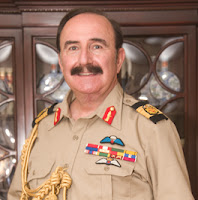FIRENZE-NUOVA ROMA 7 October 2022 (NRom)
On the Feast of Our Lady of Victory, His Holiness the Papa-Catholicos of Rome-Ruthenia, Rutherford I released the following pontifical letter entitled Conquering Hypocrisy and Satan.
“O ye hypocrites, ye can discern the face of the sky; but can ye not discern the signs of the times?” (Luke 12.56). Hypocrisy is a well-known trait – so much so that we perhaps have all become numb to it. We see it on an individual basis, and we see it in organisations and national governments. So often hypocrisy accompanies interfering in someone else’s business – an all-to-common individual and organisational trait. It is often even a national trait. Moral complacency – such as simply saying “hypocrisy is just a fact of life” – is moral complicity. On a societal scale, it is among the signs of a society that has given into satanic influences.
Hypocrisy on an individual scale can certainly cause problems for others. On an organisational, governmental, and global scale, however, the effects can be an humanitarian crisis and prolonged, escalated death and destruction. Conflict is an unfortunate but regular part of life. Between nations, cannon are the last argument of kings. Indeed, there is “…a time to love and a time to hate, a time for war and a time for peace.” (Ecclesiastes 3:8).
Yet on both a large and a small scale, there are those who seek to interfere in the business of others, and there are those that, rather than live and let live, insist on trying to force others to live and act according to their rules and according to their permission. Such interference easily makes a difficult situation worse and a tense, dangerous situation even more deadly. As our Lord said, blessed are the peacemakers. Yet some come in the guise of a peacemaker, duplicitously bringing false promises contrary to God.
Interference becomes all the more complex when one party condemns another for doing the very same thing that they themselves have done on a regular basis. The one party says that whatever they do, no matter the cost to others, no matter the merits of the initial argument or the outcome, it is righteous and good. Then they condemn the other party for doing the selfsame thing. It is a double standard in the extreme. However, it is one thing when it is merely a complaint, for the dog barks and the wind carries it away. It is an entirely different thing when interfering actions cause real damage – even more so when the damage is on a very wide scale impacting countless lives.
Now, if a particular nation did something that they have come to believe is wrong, they might potentially be correct in speaking against it when it is done by others. For that to be genuine, however, there must be true contrition – an admission of guilt coupled with acts of reparation and atonement, as well as a strong resolve that such will never be done again. Yet, this is invariably lacking, as much of the world’s leadership climbs on a moral soapbox built on the blood and bones of the victims of their policies while pointing the finger at others.
Indeed, some people claw their way to their position, even through questionable and unethical behaviour. Upon reaching their goal, they say “I have mine, so a pox on you.” They set barriers and barricades to thwart others, create rules to prevent others from making the same achievements, try to rig the system so that their permission is required for advancement, and suddenly and hypocritically condemn in others the same questionable actions that got them to their position. This is not merely an individual phenomenon, but seen in organisations. It is regularly seen in nations.
So often the “developed” nations attempt to force hegemony on other nations, particularly developing nations. A developed nation may have done certain things in its rise to power that it now decides to condemn as wrong, seeking to stop such actions from being done by other nations in their quest for development and national advancement. That is inevitably done under some sort of benevolent-sounding heading, such as environmental protection, human rights, or even peace. Yet, “[the servants of Satan] disguise themselves as servants of righteousness.” (II Corinthians 11). The real purpose is power and control. At least in the age of kings and great empires, there was no pretense in the sense of what we see today. Motivation was arguably far more transparent and honest.
Indeed, in the age of kings and great empires in Christendom, for all its faults (for anything human will be flawed), underlying society was at least the firm footing of the Christian faith. Despite human frailty, laws, policies, diplomacy, and even warfare were built on a foundation of the Christian faith. As the Apostles tell us, works without faith are meaningless, and faith without action is no faith at all. Much of the world today has indeed lost its faith and become guided by satanic influences.
What can we do? First, we must learn to separate those things that we can control from those things that we cannot. Even the most powerful men on earth cannot control everything, no matter how they may try. Then we must seek on an individual basis to build our entire lives on the Christian faith. Everything we do, while still recognising our frailty as humans, must flow from the altar of God. We must encourage this in others, both by words and above all by our own example. Since society is comprised of individuals, individual faith and faith-based action can only serve to remove Satan from power and improve society as a whole. This then can improve government and world events. As our Lord said, “If you had faith like a grain of mustard seed, you could say to this mulberry tree, ‘Be uprooted and planted in the sea,’ and it would obey you.” (Luke 17.6.) Therefore, “put on the full armour of God, so that you can take your stand against the devil’s schemes.” (Ephesians 6.11.)

































